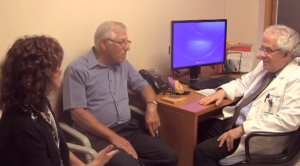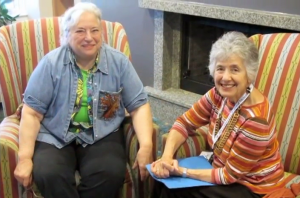By Malka Young, LICSW, Director of Community Impacts, JFS of Metrowest
The last time I saw the doctor; I drove into Boston, went through a maze of dark parking levels, backed into a narrow parking space, and traversed long corridors. I rushed, only to fill out my personal information forms that I had completed on previous visits and wait. I marvel that individuals much older than me had to do this on their own before the Jewish Family Services (JFS) of Metrowest’s Patient Navigator Program started in late 2012.
This past year, the JFS Patient Navigator Program organized 38 trained volunteers to escort 91 Framingham area frail older adults to over 350 medical appointments, travelling thousands of miles and spending hundreds of hours helping them access medical care and supporting their independence. Today, over 200 older adults have registered with the program. This month, we have trained six new Patient Navigator volunteers, meeting the goal of having 50 trained on-call volunteer patient navigators to help patients access their providers and maximize each medical visit.
The Patient Navigator Program began as a solution to a problem identified by JFS social workers while doing specialized case management for diabetes patients. These patients denied having any problems managing their diet, understanding their medications, or following through after a doctor’s appointment, yet it was clear that their medical encounters were not affecting their blood test results. When JFS staff accompanied the patient to the provider and assisted them, patients could better follow through on their care. Remarkably, not only was the patient’s diabetes better managed, but patients were able to better manage their other chronic conditions too.
We wondered: How could we bring this to scale? The cost of assigning staff to every frail elder would be prohibitive. JFS realized that it could develop a flexible volunteer option for older adults that featured training, recognition, guidance, and compensation for personal costs in congruence with The World Health Organization’s guidelines for Age Friendly Cities for civic participation.*JFS’s Patient Navigator Program identifies highly motivated, dedicated older adults who are comfortable in the health care environment, and train them on aspects of care management: Preparing a patient for the medical encounter, bringing them to their appointment, waiting with them, taking notes during the consultation (on a structured form to guide them), making sure that the patient has follow up appointments, stopping at the lab when necessary, picking up their prescriptions on the way home, and providing companionship and emotional support.

A Patient Navigator assists a patient during a doctor’s appointment.
The initial cohort of intrepid pioneering volunteers went out into the field applying the wisdom they had learned over the course of two full days in the classroom. Since this initial group, the program has expanded to serve a more diverse population with trained navigators who speak Mandarin Chinese, Spanish, and Russian. JFS collaborates with other community-based organizations including the Greater Boston Chinese Golden Age Center, the Latino Health Insurance Program, the Framingham Housing Authority and the Framingham Council on Aging.
Who are these remarkable volunteers? They are retired nurses, therapists, dentists, computer programmers, librarians, teachers and other professionals. Stay at home moms and workers with flexible schedules are also drawn to the program. They either have experience professionally or personally with the health care system as patients or caregivers. Here is one volunteer’s story that is among the 23 percent who not only give generously of their time to individual patients, but also volunteer as trainers, mentors, recruiters and office support staff.
Why do they give so generously of their time? Lesley, a patient navigator sent me this E-mail:
Just called a new PN client, Frieda T, who I will be taking out on Monday. When I asked the standard, “Is there any specific help that you would like from me during this visit?” her reply was, “I feel very spoiled. I have never had such a wonderful offer before. […] I am happy and independent where I am now living. You are the best thing.”
If you want to join JFS’ team of dedicated volunteer patient navigators, and make a difference in an older adult’s life, the next training is scheduled for Monday, March 23rd from 9 AM to 3 PM. To learn more about JFS or its other services for older adults and caregivers including affordable Geriatric Care Management, call 508-875-3100×110 or find us online at http://www.jfsmw.org/.
JFS expanded a small pilot into a larger community resource that creates meaningful volunteer service for active older adults and provides enhanced access to medical care for their more vulnerable age mates. Would a program like this work in your community? What would be the best way to share what we are learning? Share your thoughts in the comments below!
*WHO researched the environmental and social factors that contribute to active aging in urban areas. Making cities age-friendly is one of the most effective policy approaches for responding to demographic ageing. These guideline published in 2007, are used as a basis for developing guidelines for primary prevention interventions that affect health outcomes and quality of life not only for older adults, but for the population as a whole. By promoting best practices, they can be used to target interventions that will have the most impact on the health and well being of older adults.

